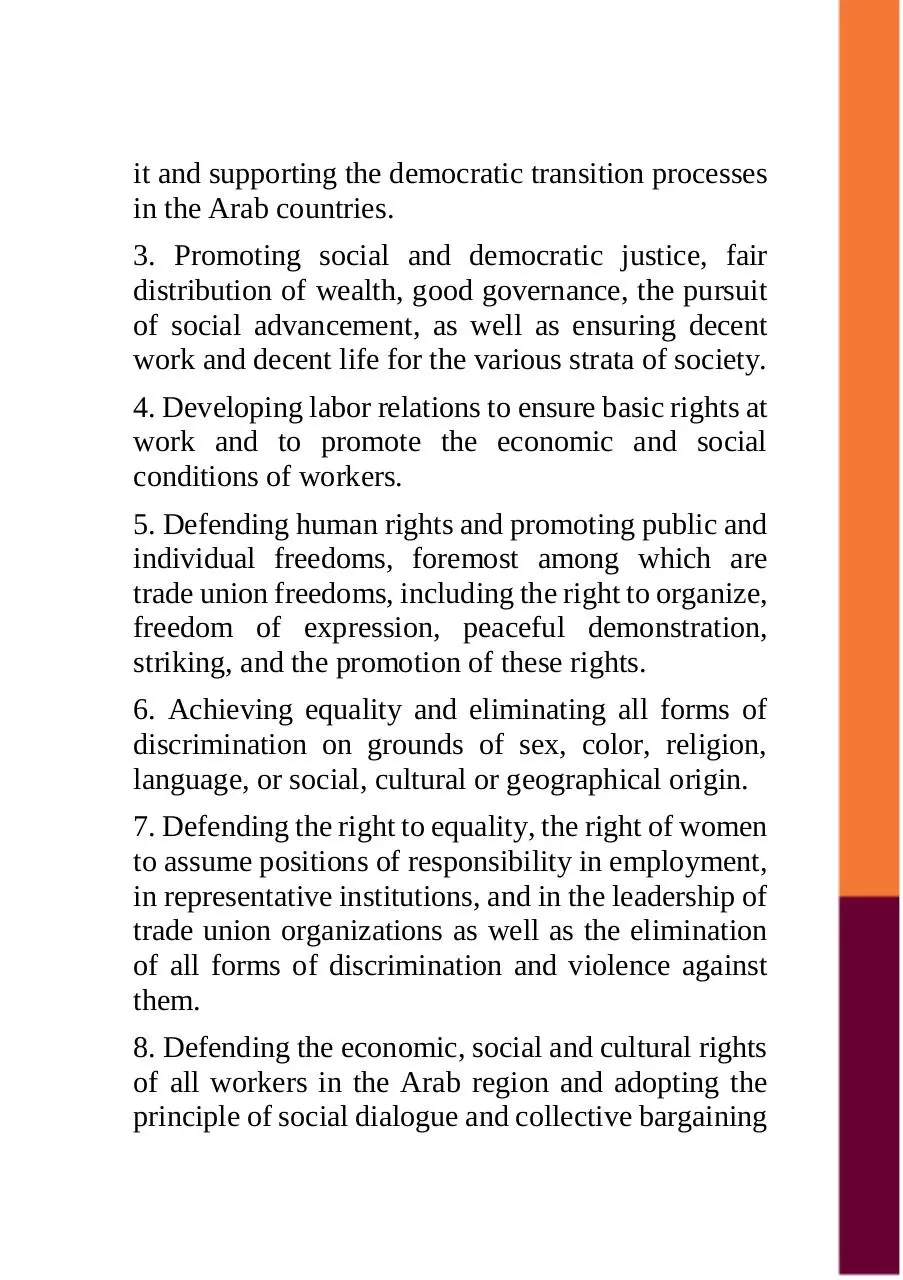constitution eng (PDF)
File information
Title: Print
Author: Windows User
This PDF 1.5 document has been generated by Microsoft® Word 2013, and has been sent on pdf-archive.com on 29/05/2017 at 17:24, from IP address 188.247.x.x.
The current document download page has been viewed 455 times.
File size: 543.97 KB (23 pages).
Privacy: public file





File preview
Declaration of Principles and Objectives
The Arab Trade Union Confederation is a union
organization based on the principles and objectives
of the International Federation of Trade Unions. It
includes all Arab union organizations that are
members of the International Federation of Trade
Unions, the International Federation of African
Trade Unions, and the International Trade Union
Confederation - Asia Pacific, as well as those that are
part of the following Arab countries: Mauritania,
Morocco, Algeria, Tunisia, Libya, Egypt, Jordan,
Palestine, Lebanon, Syria, Iraq, Yemen, Bahrain,
Kuwait, Sultanate of Oman, Qatar, UAE and Saudi
Arabia. The Confederation is based on the same
principles and objectives of the International
Federation of Trade Unions and maintains legal
personality.
The objectives of the Confederation
are:
1. Defending the right of all workers to union
organization and exercising it freely, and promoting
the building of independent and democratic trade
unions working in a transparent manner.
2. Working to unify the Arab democratic trade union
movement in order to meet the new challenges facing
it and supporting the democratic transition processes
in the Arab countries.
3. Promoting social and democratic justice, fair
distribution of wealth, good governance, the pursuit
of social advancement, as well as ensuring decent
work and decent life for the various strata of society.
4. Developing labor relations to ensure basic rights at
work and to promote the economic and social
conditions of workers.
5. Defending human rights and promoting public and
individual freedoms, foremost among which are
trade union freedoms, including the right to organize,
freedom of expression, peaceful demonstration,
striking, and the promotion of these rights.
6. Achieving equality and eliminating all forms of
discrimination on grounds of sex, color, religion,
language, or social, cultural or geographical origin.
7. Defending the right to equality, the right of women
to assume positions of responsibility in employment,
in representative institutions, and in the leadership of
trade union organizations as well as the elimination
of all forms of discrimination and violence against
them.
8. Defending the economic, social and cultural rights
of all workers in the Arab region and adopting the
principle of social dialogue and collective bargaining
as the best ways to improve work relations.
9. Achieving Arab economic integration as a
necessary condition for achieving economic and
social growth throughout the Arab region.
10. Combating all forms of human trafficking and
exploitation in all its forms; sexual, forced,
compulsory, domestic and foreign.
11. Defending the rights of migrant workers and
addressing all forms of discrimination and
exploitation they may face.
12. Working on developing youth work, and
expanding Arab efforts to combat unemployment,
unstable employment, and social exclusion, in
addition to defending the interests of young workers
and protecting their rights.
Acting against poverty, hunger, exploitation,
oppression,
corruption,
inequality
and
discrimination.
13.
14. Working to combat child labor, and protecting the
rights of workers, domestic workers, and vulnerable
groups as well as defending girls and children who
are exploited and forcibly displaced in various ways
and methods.
15. Requesting
to draft a comprehensive and
sustainable participatory development policy in Arab
countries for social democracy and a fair distribution
of national wealth to preserve the dignity of all
workers and social groups.
16. Taking all measures to promote and increase
trade union memberships in the Arab area.
17. Strengthening Arab and international labor union
solidarity, in addition to supporting and encouraging
oppressed labor unions.
18 Strengthening the links of cooperation and
solidarity with civil society organizations that have
the same principles and values of the Federation of
Arab Trade Unions and various social movements
against wild liberalism.
19 Defending the rights of people with special
needs, working to strengthen them, supporting
retirees and protecting their interests and organizing
them in unions.
20. Rejecting all forms of colonialism and foreign
intervention and supporting all peoples to regain their
sovereignty and self-determination. Moreover,
supporting the struggle of Arab and international
liberation movements, and defending the right of the
Palestinian people to liberate their land and establish
their independent state.
Chapter 1: Membership
Article 1: Membership procedures, rights and
responsibilities
1. Arab trade union organizations may apply for membership
in the International Trade Union Confederation, and the
International Confederation of African Trade Unions, the
International Trade Union Confederation - Asia Pacific, and
the Arab Trade Union Confederation. Membership approval
procedures are subject to the rules of the International Trade
Union Confederation. The Arab Trade Union Confederation
is consulted with regard to membership applications.
2. The Executive Office of the Confederation may invite
representatives from some trade union organizations, civil
society organizations, experts and specialists to attend
meetings of the General Council or the Conference as
observers.
3. The member organizations shall maintain their full
independence at the national level, are allowed to take their
own decisions, develop their orientations and formulate their
policies. The principles and objectives are set forth in the
Constitution of the International Trade Union Confederation,
and approved by the Arab Trade Union Confederation. The
member organization shall keep the Union informed of its
activities at the national level.
4. Any organization may withdraw from the membership of
the Union provided that written notice of the content is given
three months in advance. For the withdrawal notification to be
legal, the organization must not be late in paying its
receivables. The withdrawal does not exempt the withdrawing
organization from paying its arrears.
5. In the event of any violation of the Constitution of the
Union and the International Trade Union Constitution and in
the event of damage to their interests, the Executive Office or
the General Council of the Union may instruct the Internal
Rules Committee to study the case. It shall then submit a
report to the Executive Office to be referred to the General
Council session of the Union in order to take the appropriate
decision.
6. In the event of the suspension of membership of a
trade union organization, the power of delegation of
its representatives in the constitutional bodies of the
Union shall automatically expire.
7. Member organizations shall fulfill their financial
obligations to the International Federation of Trade Unions, as
well as the International Federation of African Trade Unions,
and the International Trade Union Confederation - Asia
Pacific
8. Members shall enjoy equal rights and duties and
shall be entitled to participate in the activities of the
Union and to be regularly informed in conformity
with the provisions of this Constitution.
9. Member organizations shall receive the solidarity
and assistance of the Union when needed. Each
member organization must contribute to the
solidarity campaigns launched by the Union with
organizations facing difficult and exceptional
situations.
10. Each member organization must defend the
Union in all available ways if the Union is subjected
to attacks or campaigns aimed at weakening or
abusing it.
11. The same membership conditions as provided for
in the provisions of this Constitution apply to partner
organizations. Such organizations shall have the
responsibilities provided for in the provisions of this
Constitution except for the financial responsibilities
of the Confederation. Moreover, these organizations
have the same rights as the provisions of this
Constitution except for the right to vote.
Chapter 2: Internal structures
Article 2: Union bodies
The Federation consists of the
following bodies:
A. Decision bodies:
General Conference
General Council
Head Committee
B. Executive bodies:
Executive Office
Executive Secretary
The Women's Committee
The Youth Committee
C. Supervisory bodies
Internal Rules Committee
Financial Supervision Committee
Article 3: Conference
1. The Conference is the supreme decision body of the
Union and convenes every four years at the invitation
of the General Council and exceptionally by the request
of the simple majority (50% + 1) of the member
organizations.
2. An attendance of (50% + 1) of member
organizations is required for the legitimacy and
convening the ordinary or extraordinary General
Conference, and in the absence of a quorum, the call
will be redirected within a month to have it convened
with attendees.
3. An extraordinary conference shall be convened by the majority
(50% + 1) of the members of the General Council.
4. At the opening of its session, the Conference shall elect a
committee from among its members consisting of a
Chairman, two Vice-Chairpersons and two rapporteurs.
5. In the absence of the Chairman, or at his request during
the session or during a part thereof, the meeting shall be
chaired by one of the Vice-Presidents.
Article 4: Conference Delegates
The representatives of the Conference are representatives of
all trade union organizations members of the Union on the
basis of proportional representation according to the
following table:
First Group 1 - 50000
Second Group 50001 - 200000
Third Group 20001 - 400000
Fourth Group 400001 and above
(2) Two representatives
(4) Four representatives
(6) Six representatives
(8) Eight representatives
Controversial decisions have the votes cast based on the
proportional representation rule as shown above, with the first
group having one vote for each organization and the fourth
Download constitution eng
constitution _eng.pdf (PDF, 543.97 KB)
Download PDF
Share this file on social networks
Link to this page
Permanent link
Use the permanent link to the download page to share your document on Facebook, Twitter, LinkedIn, or directly with a contact by e-Mail, Messenger, Whatsapp, Line..
Short link
Use the short link to share your document on Twitter or by text message (SMS)
HTML Code
Copy the following HTML code to share your document on a Website or Blog
QR Code to this page

This file has been shared publicly by a user of PDF Archive.
Document ID: 0000603608.